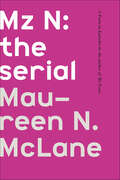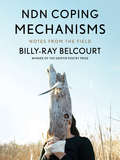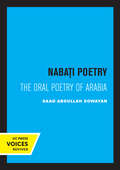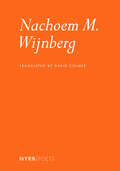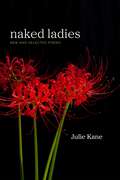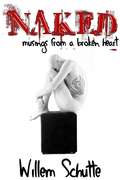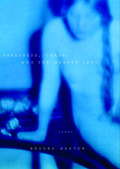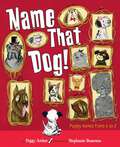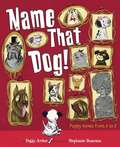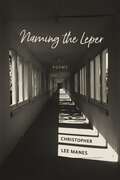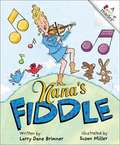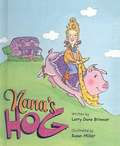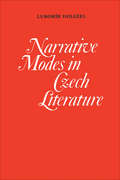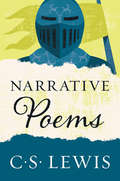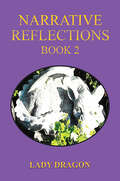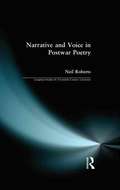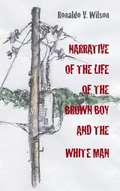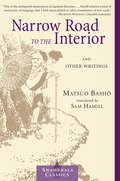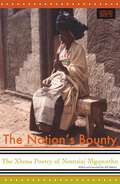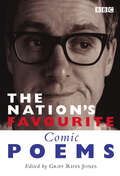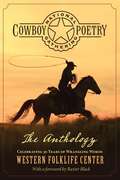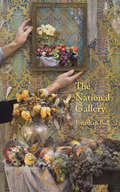- Table View
- List View
Mz N: A Poem-in-episodes
by Maureen N. McLaneThe acclaimed poet, memoirist, and essayist Maureen N. McLane here charts a new path into vital genre-bending territories. Not a novel, not a memoir, not a lyric, Mz N: the serial: A Poem-in-Episodes offers something else—“life . . . a continual allegory” (to invoke Keats): a life intense, episodic, female, sexual, philosophical, romantic, analytic. Tracking the growth of one poet’s mind, switchbacking its way through American English, Mz N toggles between story and song. This is a poetry both “furious / & alive.”Alive to the lash of love, the longueurs of adolescence, the limits of identity, Mz N: the serial: A Poem-in-Episodes is a bravura experiment in life-writing—an assaying, a testing, a transforming, an honoring of the tentative and the torqued. What is it to be contemporary, to be “one / among other ones” in a “cracking world”? How does a body vibrate into being? How is a mind made out of other minds? Seizing the queer realities of any life, Mz N explores how one is surprised, seduced, and struck into speech, thought, song, silence. “Then, what is life?” cried Shelley. So too Mz N.
NDN Coping Mechanisms: Notes from the Field
by Billy-Ray BelcourtIn his follow-up to This Wound is a World, Billy-Ray Belcourt’s Griffin Poetry Prize–winning collection, NDN Coping Mechanisms: Notes from the Field is a provocative, powerful, and genre-bending new work that uses the modes of accusation and interrogation. He aims an anthropological eye at the realities of everyday life to show how they house the violence that continues to reverberate from the long twentieth century. In a genre-bending constellation of poetry, photography, redaction, and poetics, Belcourt ultimately argues that if signifiers of Indigenous suffering are everywhere, so too is evidence of Indigenous peoples’ rogue possibility, their utopian drive.In NDN Coping Mechanisms: Notes from the Field, the poet takes on the political demands of queerness, mainstream portrayals of Indigenous life, love and its discontents, and the limits and uses of poetry as a vehicle for Indigenous liberation. In the process, Belcourt once again demonstrates his extraordinary craft, guile, and audacity, and the sheer dexterity of his imagination.
Nabati Poetry: The Oral Poetry of Arabia
by Saad Abdullah SowayanThis title is part of UC Press's Voices Revived program, which commemorates University of California Press’s mission to seek out and cultivate the brightest minds and give them voice, reach, and impact. Drawing on a backlist dating to 1893, Voices Revived makes high-quality, peer-reviewed scholarship accessible once again using print-on-demand technology. This title was originally published in 1985.
Nachoem M. Wijnberg
by Nachoem M. WijnbergA new translation of work by one of the Netherland's most innovative, exhilarating poets, a poet who draws on everything from economics to parables to world history. The Dutch poet Nachoem M. Wijnberg is one of the most inventive, surprising, entertaining, and thought-provoking poets writing today. He is also remarkably productive, so that up to now only a small portion of his extensive body of work has appeared in English translation. This new selection of poems draws on all twenty volumes Wijnberg has published to date, constituting an indispensable introduction to this wry, off-kilter, spellbinding modern master. Wijnberg, not only a poet but a professor of business studies—hence his persistent concern with questions of value, real and false—writes only in the plainest language while displaying a formidable erudition. His poems engage economics, philosophy, and history; he writes Chinese poems and Jewish poems and classic songs; he tells stories that may or may not be parables; he writes from where the mind meets the heart. &“Tell all the truth but tell it slant,&” Emily Dickinson enjoins. Wijnberg for his part has said, &“Alienation is the last thing I am trying to achieve. The world is strange enough as it is and my poems help in dealing with that strangeness by bringing it close and as far as possible trying to understand it.&”
Nagarjun Rachna Sanchayan
by Rajesh JoshiAfter Nirala, Nagarjun is the only poet who has used so many verses, forms and poetic styles. His expression is very proper and direct. His poems and stories mostly tell us about the part of the country where he stayed. In his style, one would find both the independence of wanderlust and speed.
Naked Ladies: New and Selected Poems (Southern Messenger Poets)
by Julie KaneCapturing the breadth of Julie Kane’s poetics across nearly four decades—formalist and neo-confessional, steeped in both Boston Irish-American and New Orleans cultures—Naked Ladies displays the full range and achievement of her work. Gathered here in one volume are selections from Kane’s five previous collections, including her long-out-of-print first book and her subsequent winners of the National Poetry Series and Donald Justice Poetry Prize. Readers will also find a generous selection of new and previously uncollected work. The title of this milestone collection acknowledges Kane’s place in the tradition of women confessional poets, evokes the nickname of a common Louisiana flower, and nods to the honesty and frankness that characterize her poems’ speakers.
Naked: Musings from a Broken Heart
by Willem Schutte“From within perfect darkness I have learned to shine."Heartbreak can leave even the strongest of men scarred. Like Icarus, I too flew too high and fell. That downward journey tore the fibre of my being and shredded my soul. The gauntlet of love should never be underestimated.However, I had to get up again and rise like a phoenix from its proverbial ashes. And like a phoenix, I took to flight!This is a poetic account of the journey I had to go through and a tribute to becoming a better man regardless.
Nakedness, Death, and the Number Zero: Poems
by Brooks HaxtonThe critically acclaimed poet and translator Brooks Haxton embraces life, from our naked beginnings to the first signs of middle age and beyond, in this inviting collection of poems. The book opens with the dramatic birth of twins, and speaks in the intimate voice of a husband, father, and poet. Diverse products of the imagination pass through Haxton’s generous mind—the mysterious number zero, Milton’s “Lycidas,” nuclear technology—even as he captures the humor and pathos of the everyday. In these brief, exquisite lyrics, meditations, and short stories in verse, he immerses his reader in the heat of teenage rivalry and friendship, the tender comedy of sex, and the amazements of the natural world. Here, from a book indelible in its language and feeling, are the last few lines: My daughters my twin girls say Ba for bird for book for bottle—Ba: in Egypt, bird with a human head, the soul. They wake and wake their mother. Ba! They point into the dark. Ba, Ba! they say, and back to nursing weary in her arms. From the Hardcover edition.
Name That Dog
by Peggy ArcherGot a new puppy and need to find the perfect name? In twenty-six poems, told from A to Z, meet dogs of every type and personality imaginable. Does the puppy love to nap in the flowers? Name her Daisy! Maybe the puppy slips his collar. He's Houdini! And don't forget Melody, a dog who howls and croons to any kind of music.For pet owners and dog lovers alike, this funny, rhyming collection will be sure to inspire love and laughs for any puppy personality.
Name That Dog!
by Peggy Archer Stephanie BuscemaGot a new puppy and need to find the perfect name? In twenty-six poems, told from A to Z, meet dogs of every type and personality imaginable. Does the puppy love to nap in the flowers? Name her Daisy! Maybe the puppy slips his collar. He's Houdini! And don't forget Melody, a dog who howls and croons to any kind of music. For pet owners and dog lovers alike, this funny, rhyming collection will be sure to inspire love and laughs for any puppy personality.
Naming the Leper: Poems
by Christopher Lee ManesBetween 1919 and 1941, five relatives of Christopher Lee Manes were diagnosed with an illness then referred to as “leprosy” and now known as Hansen’s disease. After their diagnosis, the five Landry siblings were separated from their loved ones and sent to the National Leprosarium in Carville, Louisiana, where they remained in quarantine until their deaths. Drawing on historical documents and imaginative reconstructions, Naming the Leper tells through poetry this family’s haunting story of exile and human suffering. While confined at Carville, the Landry siblings attempted to keep some connection to the outside world by writing letters to family members and other loved ones. Manes incorporates materials from this correspondence, along with medical records, the leprosarium newsletter, and personal interviews, as he crafts poems that reconstruct his relatives’ daily lives at Carville. Although much can only be imagined, their words remain factual and their feelings of loneliness, abandonment, and pain become explicit. Poetry cannot bring Manes’s relatives back to life, nor can it heal wounds nearly a century old, but it can capture the sufferings and traumas caused by disease and exile. As a work of documentary poetry, Naming the Leper demonstrates that a term like “leper,” whether a stigma attached to patients suffering from illness or a word inscribed on the caskets of the deceased, cannot define the lives of individuals or encompass the full extent of their legacies.
Nana's Fiddle
by Larry Dane BrimnerAlthough her neighbors are reluctant to listen to her play the fiddle, Nana persists and her hog steals the show.
Nana's Hog
by Larry Dane BrimnerAlthough people think her behavior improper, Nana rides a hog through town.
Narrative Modes in Czech Literature
by Lubomir DolezelIn this study of the study of the linguistic approach to narrative structures, the author examines the question of point of view in fiction, drawing examples from Czech literature. He applies the methods of structural linguistics and literary studies as developed by the Prague Linguistic School, and the modern methodology of semiotics and text theory. This approach, widely used in Czechoslovakia and elsewhere in Europe, is not as well known as it should be in the English-speaking world. The essays may be read without any knowledge of the Czech language or Czech literary history. All Czech examples and materials are translated into English, preserving traits of the original texts which are relevant for structural analysis; the original Czech of all examples appears in an appendix. While the examples serve as documentation for theoretical statements, they also serve to familiarize the English-speaking reader with some of the major works of Czech fiction, especially those of Komenský (Comenius), Rais Ĉapek, Vanĉura, Pujmanová, Olbrachtm and Kundera. These works demonstrate the continuous bond between Czech fiction and European literary traditions, and offer original and profound insights into the cultural, social, and political experience of the Czech nation. Of particular interest to specialists in Slavic studies, general linguistics, poetics and text theory, and to students of general and comparative literature, Narrative Modes in Czech Literature deals with a significant problem of poetics and makes an original, constructive contribution to the theory of literature in the English language.
Narrative Poems
by C. S. LewisA repackaged edition of the revered author’s collection of four poems: "Dymer," "Launcelot," "The Nameless Isle," and "The Queen of Drum."C. S. Lewis—the great British writer, scholar, lay theologian, broadcaster, Christian apologist, and author of Mere Christianity, The Screwtape Letters, The Great Divorce, The Chronicles of Narnia, and many other beloved classics—was also a talented poet. In this collection of four longer works of verse, Lewis displays his deep love for medieval and Renaissance poetry and themes, influences that shaped—and resonate through—his fiction.
Narrative Reflections – Book 2
by Lady DragonNarrative Reflections Book 2 is Rosemary’s second published poetry book and represents her vivacity as she continues her life’s journey. This book’s theme relates to life in general, the natural environment, family, emotions, and a modest amount of humour – just for fun!
Narrative and Voice in Postwar Poetry (Longman Studies In Twentieth Century Literature)
by Neil RobertsPoetry in English since the Second World War has produced a number of highly original narrative works, as diverse as Derek Walcott's Omeros, Ted Hughes' Gaudete and Anne Stevenson's Correspondences. At the same time, poetry in general has been permeated by narrative features, particularly those linguistic characteristics that Mikhail Bakhtin considered peculiar to the novel, and which he termed "dialogic". This book examines the narrative and dialogic elements in the work of a range of poets from Britain, America, Ireland, Australia and the Caribbean, including poetry from the immediate postwar years to the contemporary, and novel-like narratives to personal lyrics. Its unifying theme is the way in which these poets, with such contrasting styles and from such varied backgrounds, respond to and creatively adapt the language-worlds, and hence the social worlds in which they live. The volume includes a detailed bibliography to assist students in further study, and will be a valuable resource to undergraduate and postgraduate students of contemporary poetry.
Narrative of the Life of the Brown Boy and the White Man
by Ronaldo V. WilsonWINNER OF THE 2007 CAVE CANEM POETRY PRIZE Selected by Claudia Rankine Prose poems that profile the interrelationship of the two central characters, looking deeply into their psyches and thoughts of race, class, and identity.
Narrow Road to the Interior
by Matsuo Basho Stephen Addiss Sam HamillHere is the most complete single-volume collection of the writings of one of the great luminaries of Asian literature. Basho (1644-1694)--who elevated the haiku to an art form of utter simplicity and intense spiritual beauty--is best known in the West as the author of Narrow Road to the Interior, a travel diary of linked prose and haiku that recounts his journey through the far northern provinces of Japan. This volume includes a masterful translation of this celebrated work along with three other less well-known but important works by Basho: Travelogue of Weather-Beaten Bones, The Knapsack Notebook, and Sarashina Travelogue. There is also a selection of over two hundred fifty of Basho's finest haiku. In addition, the translator has provided an introduction detailing Basho's life and work and an essay on the art of haiku.
Nation's Bounty: The Xhosa Poetry of Nontsizi Mgqwetho
by Jeff OplandA beautiful study of the incredible life of Nontsizi MgqwethoFor nearly a decade Nontsizi Mgqwetho contributed poetry to a Johannesburg newspaper, Umteteli wa Bantu, the first and only female poet to produce a substantial body of work in Xhosa. Apart from what is revealed in these writings, very little is known about her life. She explodes on the scene with her swaggering, urgent, confrontational woman's poetry on 23 October 1920, sends poems to the newspaper regularly throughout the three years from 1924 to 1926, withdraws for two years until two final poems appear in December 1928 and January 1929, then disappears into the shrouding silence she first burst from. Nothing more is heard from her, but the poetry she left immediately claims for her the status of one of the greatest literary artists ever to write in Xhosa, an anguished voice of an urban woman confronting male dominance, ineffective leadership, black apathy, white malice and indifference, economic exploitation and a tragic history of nineteenth-century territorial and cultural dispossession. The Nation's Bounty contains the original poems alongside English translations by Jeff Opland. It was the first of a number of new titles planned for release in the African Treasury Series, a premier collection of texts by South Africa's pioneers of African literature and written in indigenous languages. First published by Wits University Press in the 1940s, the series provided a voice for the voiceless and celebrated African culture, history and heritage. It continues to make a contribution by supporting current efforts to empower and develop the status of African languages in South Africa.
Nation's Favourite: Comic Poems
by Griff Rhys JonesThis wonderful anthology contains some of the nation's all-time favourite comic poetry. From much-loved classics such as Lewis Carroll's curious 'Jabberwocky' to lesser known and forgotten gems such as Gelett Burgess's 'The Purple Cow', Griff Rhys Jones takes us on a poetic tour of witty, nonsensical and plain laugh-out-loud funny poems. The selection brings together poets from every age and every walk of life, from Shakespeare to Victoria Wood and from Keats to Benjamin Zephaniah. There is Roald Dahl's cunning variation on 'Little Red Riding Hood', Spike Milligan's brilliantly ridiculous 'On the Ning Nang Nong' as well as several entries from the ever-elusive Anon, including one delightfully succint 'Peas'. Remembered, half-remembered, cherished or written on a tea towel, here are some of the nation's favourite comic poems.
National Cowboy Poetry Gathering: The Anthology
by Western Folklife CenterThe National Cowboy Poetry Gathering is the granddaddy of all cowboy poetry events, proclaimed by the US Senate in 2000 in recognition of its pioneering role in the preservation and revitalization of this important American tradition. In conjunction with the 30th anniversary of the event, this commemorative volume collects 100 poems by various cowboy poets who have appeared at the gathering over the last three decades, from Baxter Black and Wallace McRae to Georgie Sicking and Paul Zarzyski. Representing the best contemporary cowboy poetry from the first gathering to the present, the poets and poems are culled for their importance and quality with consideration for a wide range of topics that represent the richness and depth of this broad genre. In addition to poems that will make you smile, sigh, or sit up straight in your saddle, the anthology features expressive photos of the contributors, biographical and explanatory headnotes, relevant artwork from the Western Folklife Center&’s extensive archives, and illuminating sidebars on various topics such as working cattle; life on the land; the relationship between cowboy poetry and song; gear, horses, or cattle mentioned in poems; and profiles and photos of important cowboy poets from earlier times. Cowboy poet extraordinare Baxter Black will provide a foreword, and Charlie Seemann, executive director of the Western Folklife Center, will write an introduction that gives context both to the event itself and to cowboy poetry in general, from the days of the trail drives in the nineteenth century to the lives of the hardworking men and women who still ranch and live on the land in the West today.
National Gallery
by Jonathan BallA poetic collage of art in the modern world: from Rilkean elegies for an iPhone to a meditation on Melville's classic <P><P> Jonathan Ball's fourth poetry book, the first in seven years, swirls chaos and confession together. At the book's heart is a question: Why create art? A series of poetic sequences torment themselves over this question, offering few answers and taking fewer prisoners. Loose sonnets that consider the artistic creations of Leatherface, monster-killer from The Texas Chain Saw Massacre, sit alongside Rilkean elegies for an iPhone. Surreal meditations on the collage work of Guy Maddin are followed by all of the lines from Melville's Moby-Dick that mention "salt." Politicians and painters jostle while absurdist humour crashes into stark admissions of vulnerability in the wake of having children. A startling diversity of styles and subjects feed into the maelstrom of The National Gallery, and its dark currents will draw you in to drown.
